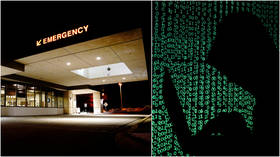FBI warns of ‘imminent cybercrime threat to US HOSPITALS,’ sending media & pundits into overdrive to blame ‘Russian hackers’

Federal agencies have warned of an impending wave of cyber attacks on US hospitals they say could affect operations amid the Covid-19 pandemic, as corporate media outlets race to find ways to blame Moscow free of any evidence.
The FBI, CISA (Cybersecurity and Infrastructure Security Agency) and the Department of Health and Human Services issued a joint statement on Wednesday sounding alarms over the “imminent” hacking operations, assessing that “malicious cyber actors are targeting the [Healthcare and Public Health] Sector with Trickbot malware, often leading to ransomware attacks, data theft, and the disruption of healthcare services.”
These issues will be particularly challenging for organizations within the Covid-19 pandemic; therefore, administrators will need to balance this risk when determining their cybersecurity investments.
While the official alert – based on “credible information” – gave no indication of who might be responsible for the possible hacks, only generically referring to a “cybercriminal enterprise,” mainstream news agencies wasted no time before finding Russian fingerprints all over the alleged scheme. Major outlets including the New York Times, the Washington Post and the Associated Press confidently declared that “Russian hackers,” or “Russian-speaking criminals,” were the culprits. But despite the appearance of corroboration, all three reports rely on the same cyber expert – Alex Holden of Hold Security – whose claims of Russian involvement were relayed without evidence.
Also on rt.com ‘Russian hacking’! Media reverts to form in responding to Hunter Biden/Burisma reportThe AP’s report acknowledges that “no provable ties” to Moscow had been established, but it nonetheless quotes Holden as saying “I absolutely have no doubt that the Russian government is aware of this operation – of terrorism, really.” How he arrived at that conclusion, however, is left a mystery. The Post similarly pinned the attacks on “Russian-speaking criminals” in its headline, but leaves that allegation entirely unsourced.
Ah yes, 10% is a number only old Russian churchgoers use, and hackers are famously pious.
— Jeff Vader (@zezezebe) October 29, 2020
Holden also sagely informed the Times that the hackers typically demand a 10-percent cut of victims’ earnings, which he compared to an “old Russian tradition to give 10 percent of annual revenue to the church” – apparently referring to tithing, an ancient practice observed by Christian churches all over the world with no particular relation to Russia. Perhaps Holden’s most dubious attempt to link the cyber attacks to Russians, the Times relegated the quote to the twenty-second paragraph of its story.
On tomorrows episode 'Russia Attacks The Power Grid"
— DON'Trump (@Don70162926) October 29, 2020
A number of pundits took some artistic license when tweeting out the story, with one NBC contributor and former assistant director to the FBI Frank Figliuzzi telling his followers the hacks are “Russia-based.” Meanwhile a self-avowed “expert on authoritarian states” and fervent Moscow critic, Andrea Chalupa, stated that “Russia is attacking hundreds of hospitals across the US,” reporting alleged Kremlin conspiracy as flat fact.
Boosting. Thank you so much for your work & for #GaslitNation.
— Ebony Elizabeth Thomas (@Ebonyteach) October 29, 2020
Claims of Russian hacking have proliferated in the US corporate press since the 2016 presidential election, originating with the campaign of failed Democratic candidate Hilary Clinton, which first asserted a Kremlin operation to steal emails from Clinton, her staff and the Democratic National Committee in order to help Donald Trump win the race.
"“We expect panic,” one hacker involved in the attacks said in Russian during a private exchange on Monday that was captured by Hold Security, a security company that tracks online criminals."https://t.co/1xHyyo7gGR
— Maddow Blog (@MaddowBlog) October 29, 2020
The allegation was later upheld by US intelligence officials, though the FBI never took hold of the DNC’s servers itself, instead relying on “forensic” information provided by the DNC’s cybersecurity firm, CrowdStrike. The company’s president, however, told a House hearing in 2017 that “there’s no evidence that [the emails] were actually exfiltrated,” leaving the claim largely without backing. The theory has nonetheless refused to die, with dire warnings of Russian hackers and election-meddling enduring into the 2020 race, and likely beyond.
Also on rt.com ‘Nothing to do with reality’: Embassy rejects new US claims of Russia’s cyber ops, says they aimed at fomenting RussophobiaThink your friends would be interested? Share this story!













